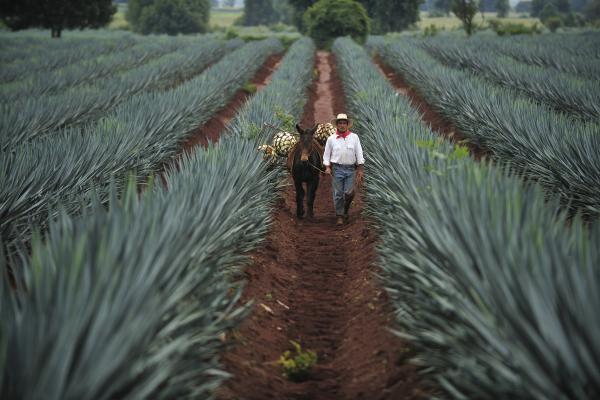FOR 18 YEARS, Ángel Pérez’s parcel sat barren. His remote village in southern Mexico offered no employment, and his only resource—his land—had been depleted by decades of overuse. When his son Manolo grew old enough, Manolo emigrated north to find work, following the footsteps of half the community and leaving his father behind. Desperation led Ángel to drink. Bottle in hand, he stared down his two options: leave his home, his community, and his land, or resign himself to a life of scarcity. (Ángel and Manolo are pseu-donyms used for privacy reasons.)
In 2014, a surge of Central American refugees streamed north through Mexico. They traveled under the stars through drug cartel territory, slipped past human traffickers, and arrived at the U.S. border pleading for sanctuary.
The following year carried another wave of asylum-seekers north. Meanwhile, the international community faced the worst refugee crisis since World War II as millions fled civil war and religious persecution in the Middle East.
Amid this global crisis, the Pew Research Center announced a surprising find: Emigration from Mexico itself was at its lowest in 20 years. Between 2009 and 2014, more Mexican immigrants returned to Mexico than came to the States. Mexicans now comprise a dwindling majority of the U.S. undocumented immigrant population—just over half, as of 2014.
Immigration’s receding tide can be traced to several factors, including harsher prosecution of undocumented workers, drug cartel violence in northern Mexico, more policing along the border, and a weakened post-recession economy. Of those who returned to Mexico after time in the States, most said they came home for the families they left.
During the 2016 presidential campaign, when I visited Ángel and Manolo in Oaxaca, Mexico, the topic of immigration had reached fever pitch. Certain words rang out above the din: Mexico. Ban. Wall. With the country’s eyes trained on the U.S.-Mexico border, the issue continues to divide communities, churches, and families. Partisan rhetoric pits jobs and homeland security against the biblical call to love the neighbor and welcome the stranger.
Crossing from Mexico into the U.S. means leaving home, family, and country behind. The fact that more Mexicans are returning home than entering the U.S. proves something that’s been true for years: Most people don’t want to emigrate. They want dignified employment and a reason to stay home. In rural farming communities across southern Mexico, they’ve found both.
A reason to stay
Undocumented Mexican immigrants still provide a large share of agricultural labor in states such as California and Texas, picking grapes or stooping over rows of strawberries season after season. But in rural communities across the border, a different narrative has taken root. In southern Mexico, subsistence farmers tend their own land instead of fields thousands of miles north. Their communities care for the earth like their lives depend on it—and they do.
Ángel Peréz’s community, Coatecas Altas, is one of Oaxaca’s many rural Indigenous villages. Tucked in the mountains 45 miles from the capital city of Oaxaca, Coatecas Altas years ago stopped receiving government support or outside resources. Families survive through subsistence farming, eating and selling whatever they can coax from the soil. Considering that the land has lost most fertility after decades of deforestation and over-farming, this is no easy task.
The hills around Coatecas Altas show wounds where trees have been slashed and burned, the soil eroded in landslides. Cinderblock walls line the main road into the community. Metal gates painted gold conceal houses built with remittances, the money sent home by emigrants. U.S. influence is visible elsewhere: On the basketball court—a slab of concrete next to the chapel—the word “Jordan” is stenciled on backboards.
“The main industry in Coatecas is emigration,” says Noé Ramírez. Ramírez is a locally employed staff member of Plant With Purpose (formerly Floresta), a U.S.-based Christian development organization that equips farming families to restore their land and grow out of poverty. (I worked with Plant With Purpose from 2013 to 2015.)
Three-quarters of the world’s poorest people depend on the land to survive, and Plant With Purpose was founded to address the link between rural poverty and environmental destruction. Since 1984, the organization’s holistic approach has integrated environmental, economic, and spiritual renewal. Plant With Purpose now partners with farming communities in Mexico, Haiti, the Dominican Republic, Thailand, Burundi, Tanzania, and the Democratic Republic of the Congo.
Developing rural agriculture is essential for building community resilience, according to research by the U.N.’s Food and Agriculture Organization (FAO). A recent report shows that sustainable farming addresses root causes of migration in rural areas. Not only that, it can shift major tides of refugees and migrants. While orderly and regular migration is both inevitable and, at times, economically beneficial, the FAO points out that “migration should be a choice, not a necessity.”
For families in rural Mexico, especially in Oaxaca and Chiapas—two of the country’s poorest states—migration is almost always an economic necessity. Recent studies show that migration to the U.S. from these regions is typically an “adaptation strategy in response to economic and social vulnerability,” one particularly sensitive to climate change.
Other organizations are working to change this reality by increasing land and food security. In the Mixteca Alta region of Oaxaca, the Center for Integral Farmer Development (locally known as CEDICAM) trains farmers in sustainable food production and environmental conservation. Like Plant With Purpose, CEDICAM promotes the use of cover crops, organic compost, and natural soil erosion barriers to revive farmland. Since its inception in 1997, the Mexican NGO has seen a fourfold increase in yields among partnering farmers—and a reduction in migration.
Last October, I traveled from San Diego to Oaxaca on a trip with Plant With Purpose. Its Mexico program, known locally as Misión Integral, was founded in 1999, and the group has partnered with Coatecas Altas since 2011. As we bumped along the road to Coatecas, Ramírez explained that no one, including Ángel, wants to leave the community. The journey is risky: Traveling to northern Mexican states such as Sonora or to the U.S. means crossing through drug cartel territory. Once they arrive, migrants usually work menial jobs thousands of miles from home. Meanwhile, their families fight to survive off their own depleted land.
“[People] emigrate because they have no alternative,” Ramírez says. “If they don’t have anything to eat, they’re going to leave and look for some form of employment.”
To stay, they need a way to survive. Plant With Purpose teaches subsistence farmers how to maximize the resources they already possess: soil, water, and agricultural know-how. As people learn to build soil fertility and grow more crops, families eat better, earn an income, and send their children to school. Sustainable farming empowers communities to survive and even thrive on their land, which means fathers, brothers, and sons stay put.
For Ángel, everything changed when he began healing his land. Suddenly his options expanded, and he found he could make a living in his own community by farming. For those living in rural villages such as Coatecas, the answer to emigration is often simple: Restore the land to restore the future.
The family orchard
After several years working migrant jobs harvesting cucumbers and tomatoes, Manolo returned home. At that time opportunities in his community were just as slim as when he left. He fell into the same patterns of alcoholism and depression as his father had while their plot of land, purchased almost two decades earlier, remained untouched.
Then a neighbor knocked on their door. A former migrant, this neighbor was sympathetic to their story. He invited them to church and then home to visit his farm. With the help of Plant With Purpose, he’d planted an orchard and started growing seedlings in a greenhouse. He told Ángel and Manolo about the projects and how his family was building a better life in Coatecas.
When they saw the family orchard, Manolo says, “We were convinced to start on our own land.”
Ramírez met with Ángel and Manolo and offered to train them to prepare their parcel for crops. He suggested planting avocados, which are traditionally only grown in the western Mexico state of Michoacán. Ángel and Manolo looked at their abandoned land and said, “Why not?” Coatecas Altas has a similar climate and soil to Michoacán, and the avocado saplings flourished on the Perez’s hillside farm.
Father and son used the sustainable-agriculture training they received to maximize every inch of their plot. They used part of the hillside to grow corn, squash, and tomatoes. They planted pine trees above the avocados, harvested runoff water for irrigation, and gathered grass during the dry season for animal feed. Theirs is the first avocado orchard in the community. The 70 trees are now two years old and already bearing fruit. While avocado trees in Michoacán produce fruit once each year, the Perez’s variety produces avocados twice yearly. Not only have Ángel and Manolo returned fertility to their soil, they’ve also established a source of food and income for years to come.
The success of their orchard prompted other Coatecas families to see their land as an answer to poverty. Neighbors were initially hesitant about trying new techniques such as conserving water, co-planting crops, and composting. But when they saw the changes in Ángel’s and Manolo’s lives—more income, healthier land, renewed dignity—the response shifted from reluctance to excitement. “Vamos a intentarlo!” they said. We’ll give it a try!
Today, families across Coatecas are caring for their land through sustainable farming. Saplings grow on farms and the hillsides are lush with crops. Water is returning to the dry streambeds, which farmers capture and distribute. Families tend gardens and raise chickens, generating an income in their own backyards by selling produce at local markets. Once defined by poverty and emigration, the people of Coatecas have grown rooted and resilient.
‘This is the plan now’
Not many years ago this community was gripped by violence. This was due in large part to emigration: Young men traveled to the U.S. for work and returned years later carrying loneliness and addictions. “For years this area and this community were considered very dangerous,” says Ramírez. “But it’s not like that anymore. The people have a hunger for God and a hunger for peace.”
Today fewer and fewer men leave to go north. Families work together to create opportunity at home, and the dignified work they’ve found in farming diminishes addictions and violence.
Looking over their avocado parcel, wide brim hats shading their eyes, Ángel and Manolo credit its success to God’s presence. God is here in the orchard, they say. They remember planting the first trees with Ramírez and praying around the saplings, their words mingling and rising into the wide Oaxacan sky.
Families in Coatecas are flipping the narrative of emigration. “People tell us, ‘Now I don’t have to go. I have an alternative,’” Ramírez says.
With each day that Ángel and Manolo work together on their farm, the threat of emigration and its attendant fears diminish. They’ve created a life for themselves in a place where they thought it was impossible to stay. “This is the plan now,” Manolo says. “We don’t need to emigrate anymore to the States—we can stay here.”
“We hope to plant more avocados, pines, and fruit trees,” he continues. He stands between two rows of avocados. Their waxy leaves point skyward. He points, too, toward the top of the hill where he will plant these seedlings. “We look forward to seeing these dreams come true.”

Got something to say about what you're reading? We value your feedback!

